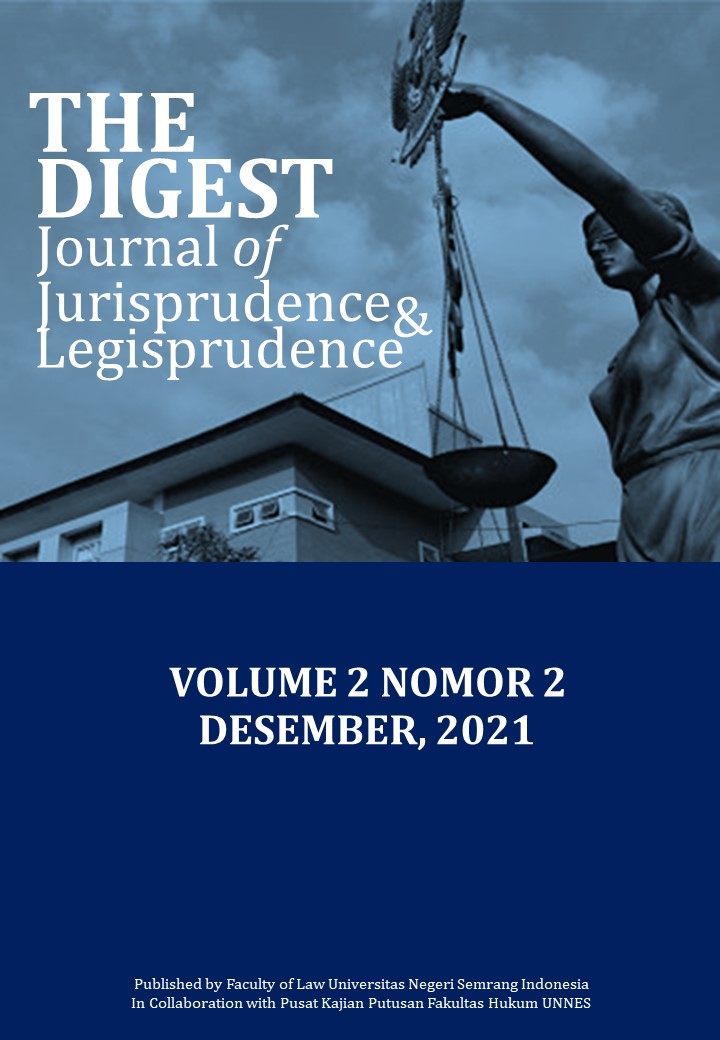Daya Ikat Putusan Mahkamah Internasional: Analisis Penyerangan Militer dan Paramiliter Amerika Terhadap Nikaragua
Main Article Content
Abstract
The problem raised in this paper is that the use of military and paramilitary forces carried out by America violates state sovereignty and international law regarding state relations (America and Nicaragua). State sovereignty gives the right of responsibility to protect the sovereignty of its people, respect and fulfill the rights of its citizens and cooperate in the international community. However, in this dispute, state sovereignty is violated by internal members of the country, especially by members of the American military and paramilitaries. Although America believes the use of force by military and paramilitary members as a means of self-defense. This study was conducted by examining relevant decisions and facts from international law, customary international law, general principles of law, international treaties, conventions, declarations and decisions of international Court of Justice (ICJ). The Nicaragua case is a legal dispute that falls under the jurisdiction of the International Court of Justice in which Nicaragua has adopted methods in accordance with international legal procedures but the United States has rejected the decision of the International Court of Justice.
Article Details
All works published in The Digest: Journal of Jurisprudence and Legisprudence are licensed & copyrighted under a Creative Commons Attribution Attribution-ShareAlike 4.0 International. Under this license, the authors published in The Digest: Journal of Jurisprudence and Legisprudence retain the copyright. All other authors using the content of The Digest: Journal of Jurisprudence and Legisprudence are required to cite the author(s) and publisher in their work.
References
D’Amato, A. (1985). Nicaragua and international law: the “Academic” and the “Real”. American Journal of International Law, 79(3), 657-664.
Gevorgyan, K. (2014). Concept of state sovereignty: Modern attitudes. Proceedings of Yerevan State University, 431-448.
Henderson, E. (2004). Article 2 (4) of the United Nations Charter: whimsical ideal or binding legal obligation in relation to Operation Iraqi Freedom?. Canterbury Law Review, (10), 105-120.
Kretzmer, D. (2013). The inherent right to self-defence and proportionality in jus ad bellum. European Journal of International Law, 24(1), 235-282.
Marxsen, C. (2015). Territorial Integrity in International Law–Its Concept and Implications for Crimea. Heidelberg Journal of International Law, 75(1), 7-26.
Modabber, Z. (1988). Collective Self-Defense: Nicaragua v. United States. Loyola of Los Angeles International and Comparative Law Review, 10(2), 449.
O’connell, M. E. (2002, August). The myth of preemptive self-defense. In The American Society of International Law (pp. 1-21).
Putra, I. B. W. (2013). Bahan Kuliah Hukum Penyelesaian Sengketa Internasional. Denpasar: FH UNUD.
Riyanto, S. (2012). Kedaulatan Negara Dalam Kerangka Hukum Internasional Kontemporer. Yustisia Jurnal Hukum, 1(3).
Roth, B. R. (2012). Sovereign equality and non-liberal regimes. Netherlands yearbook of international law, 43, 25-52.
Suryokusumo, S. (2003, July). Aspek Moral dan Etika dalam Penegakan Hukum Internasional. In Seminar Mengenai Pembangunan Hukum Nasional VIII, Diselenggarakan oleh Badan Pembinaan Hukum Nasional, Departemen Kehakiman dan Hak Asasi Manusia, Denpasar (pp. 14-18).
Weller, M., Solomou, A., & Rylatt, J. W. (Eds.). (2015). The Oxford Handbook of the use of force in international law. Oxford University Press.
Wilmshurst, E. (2006). The Chatham House Principles of International Law on the Use of Force in Self-Defence1. International & Comparative Law Quarterly, 55(4), 963-972.
Zainab, N., & Noviardi, D. N. A. (2018). Violation on State Sovereignty by Military and Paramilitary Activities on Nicaragua vs United States Case. In SHS Web of Conferences (Vol. 54, p. 05001). EDP Sciences.
[…] “Definisi dan arti kata Vis a Vis”. Kamus Hukum Online Indonesia. Diakses pada 29 Desember 2019.
